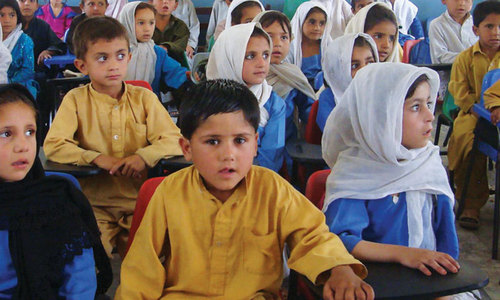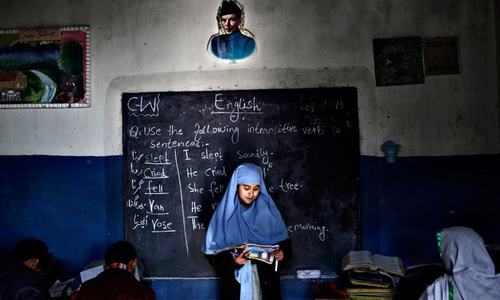ISLAMABAD: Though the number of out-of-school children has reduced from last year’s figure of 24 million to 22.6 million, statistics of 2015-16 still paint a gloomy picture, calling for the imposition of real education emergency.
As many as 44pc children between the ages of five and 16 are still out of school.
The statistics further reveal that 21pc primary schools in the country are being run by a single teacher while 14pc have one room.
These bitter facts were revealed in the Pakistan Education Statistic 2015-16 launched by the National Education Management Information System (NEMIS) – a subsidiary of the Ministry of Federal Education and Professional Training - on Wednesday.
The report says that only 30pc children remain enrolled from class 1 till 10th.
Balochistan is home to the highest proportion of out-of-school children followed by Fata
As regards to schools’ infrastructure, 40pc public sector primary schools were operating without electricity, 28pc did not have toilets, 25pc were without boundary walls and 29pc had no access to drinking water. While 7pc schools did not have any building and 43pc had unsatisfactory buildings.
According to the report, Balochistan was home to the highest proportion of out-of-school children followed by Fata.
“As many as 70pc children in Balochistan and 58pc in Fata are out of school,” the report says.
“The situation is pathetic; it has been like this for a long time and is getting worse. The government should prioritise the education sector,” said Dr Khalid Aftab, former vice chancellor of Government College University, Lahore.
“I think, the actual figure of out-of-school children is much higher than 22.6 million; how can we rely on this data,” he asked.
“Instead of focusing on infrastructural development, such as roads, the government should focus on health and education,” he added.
Dr Zafar Nawaz Jaspal from Quaid-i-Azam University, while expressing his views on the new statistics, said: “One could not deny the significance of metro buses and road networks, but the priority should be education and health sectors.”
He said the incumbent government was performing relatively well when it came to the uplift of the education sector, but a lot still needed to be done.
Earlier, while speaking at the launching ceremony, Minister of State for Federal Education Balighur Rehman said the report noted considerable improvement in the Net Enrolment Rate in Primary Education, availability of physical facilities in government schools and reduction in number of out-of-school children (OOSC).
“The number of OOSC in classes 1-12 and the age bracket of 5-16 years has reduced by 3pc per annum from 25.96 million in 2012-13 to 22.64 million in 2015-16. Punjab has outperformed other provinces by managing to reduce the number by 6pc per annum from 12.87 million to 9.92 million during the same period,” the minister said.
He said the net enrolment rate in primary education had improved at the rate of 4pc per annum from 14.65 million in 2012-13 to 17.1 million in 2015-16. Again, Punjab had fared better than other provinces, making a contribution of 6pc per annum.
The minister also appreciated improvements in physical facilities in government schools and urged provincial governments to concentrate in this area.
“After devolution the responsibility for improving quality and accessibility of education has fallen on the provincial and federal governments,” the minister said, adding that these statistics would be taken up at the upcoming Inter-Provincial Education Ministers Conference.
The minister further informed the audience that improving the adult literacy rate, initiating accelerated learning programmes for older out-of-school children and encouraging non-formal education were the three focus areas of the government aimed at improving accessibility of education.
Published in Dawn, March 9th, 2017













































